|
|
|
Sort Order |
|
|
|
Items / Page
|
|
|
|
|
|
|
| Srl | Item |
| 1 |
ID:
087568
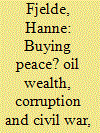

|
|
|
|
|
| Publication |
2009.
|
| Summary/Abstract |
This article argues that, contrary to received wisdom, political corruption is not necessarily associated with a higher risk of civil war in oil-rich states. Political corruption can be used to accommodate opposition and placate restive groups by offering private privilege in exchange for political loyalty. Since oil wealth is associated with large rents accruing in state treasuries, it provides an economic foundation for such clientelist rule. This article thus argues that oil-rich governments can use political corruption to buy support from key segments of society, effectively outspending other entrepreneurs of violence. Based on a logit analysis of civil war onsets, 1985-99, the article finds support for this `co-optation argument'. A negative and statistically significant interaction term between oil production and political corruption is consistent across different models and robust to a number of specifications. While both variables per se increase the risk of conflict overall, higher levels of corruption seem to weaken the harmful impact of oil on the risk of civil war. This finding suggests the need for a more nuanced understanding of the relationship between natural resource wealth, governance and armed conflict. Political corruption has prolonged poverty and bred economic and political inequality in many oil-rich states, but it has also helped cement powerful alliances with a stake in the continuation of the corrupt regimes.
|
|
|
|
|
|
|
|
|
|
|
|
|
|
|
|
| 2 |
ID:
108526
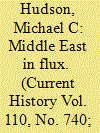

|
|
|
| 3 |
ID:
174992
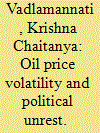

|
|
|
|
|
| Summary/Abstract |
Revenue from oil makes countries susceptible to the “resource curse” since rulers have ready access to finance for buying off opposition rather than reform. We explore this issue by examining whether oil price volatility affects anti-government unrest. We argue that in oil-producing countries, low price years generate anti-government protest conditional on a state's access to foreign exchange reserves. The prudent management of oil revenue during boom years can allow some oil-rich states to manage political dissent while others fail. Contrarily, in oil-importing countries, high oil price years increase anti-government dissent, but again, conditional on access to foreign exchange reserves, which allow governments to ease the pain of austerity. Using panel data covering 165 countries between 1980 and 2013 (34 years), we find clear evidence in support of these propositions. Oil-producer countries that are able to resist political Dutch disease and save for “rainy days” are more capable of weathering low-price years. Similarly, oil import-dependent states face higher dissent during high oil price years, but conditional on access to foreign reserves. These results are in line with others that show that some oil producers avoid civil war through heavy public spending. Oil-rich countries should manage oil revenues in ways that allow them to survive the low price years, perhaps by avoiding both economic and political Dutch disease, which will only lead to inevitable regime challenge. The results are robust to alternative data, measurement, sample size, and estimation methods.
|
|
|
|
|
|
|
|
|
|
|
|
|
|
|
|
| 4 |
ID:
165266
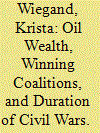

|
|
|
|
|
| Summary/Abstract |
New research has begun to underscore the complicated relationship between democratic institutions and the duration of civil wars. Specifically, greater constraints placed on executives often lead to considerably longer civil wars as leaders are limited in how they bargain with dissidents. This presents a puzzle as democracies are often seen as credible negotiators in international disputes. This article suggests that the size of the government’s winning coalition represents a double-edged sword. Larger winning coalitions allow governments to bargain more credibly but also place constraints on what governments can offer since peace agreements may alienate coalition members. Fortunately, future access to postwar oil wealth provides the feasibility for the governments to compensate hard-liners who may lose out on any settlement, making them more likely to allow concessions to rebels. This combined credibility of large winning coalitions and the feasibility provided by oil wealth allows for peace agreements, therefore shortening the duration of civil wars. We test these propositions by examining the conditional relationship between oil wealth and coalition size on the duration of all civil wars between 1950 and 2009.
|
|
|
|
|
|
|
|
|
|
|
|
|
|
|
|
| 5 |
ID:
093086
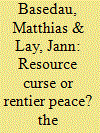

|
|
|
|
|
| Publication |
2009.
|
| Summary/Abstract |
The 'resource curse' hypothesis claims that abundance in natural resources, particularly oil, encourages especially civil war. Natural resources provide both motive and opportunity for conflict and create indirect institutional and economic causes of instability. Contrarily, the theory of the rentier state - largely neglected in the study of peace and war in this respect - suggests that regimes use revenue from abundant resources to buy off peace through patronage, large-scale distributive policies and effective repression. Consequently, such rentier states would tend to be more stable politically and less prone to conflict. These two theories thus imply ambivalent effects of resource abundance on conflict proneness. This article presents part of a solution to this apparent puzzle for the case of oil-producing countries. The key argument is that both resource wealth per capita and resource dependence need to be taken into account, since only the availability of very high per capita revenues from oil allows governments to achieve internal stability. The empirical analysis supports this hypothesis. The findings of multivariate cross-country regressions indicate a U-shaped relationship between oil dependence and civil war onset, while high resource wealth per capita tends to be associated with less violence. The results of a macro-qualitative comparison for a reduced sample of highly dependent oil exporters are even more clearcut. Using the same reduced sample, we find that oil-wealthy countries apparently manage to maintain political stability by a combination of large-scale distribution, high spending on the security apparatus and protection by outsiders. Compared to oil-poor countries and in contradiction to the rentier state theory, the institutions of oil-wealthy countries do not seem to be particularly characterized by patronage and clientelism.
|
|
|
|
|
|
|
|
|
|
|
|
|
|
|
|
|
|
|
|
|